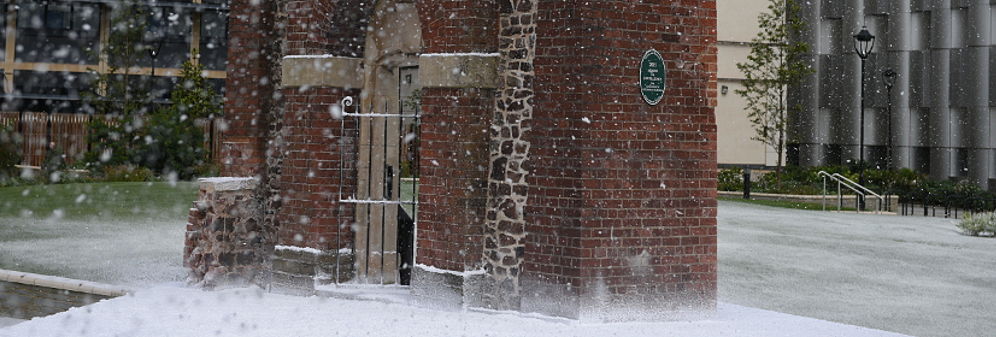Making 'snow' greener
Collaborating with industry leaders has helped to reduce both the environmental impact and cost of artificial snow.
A partnership between the University's School of Chemistry and Snow Business, the world-leading providers of artificial snow, led to the development of two new snow effect solutions used to make falling 'snow'. These new solutions are not only helping to deliver more sustainable winter wonderlands, but they are also reducing costs for small business.
Fundamental research in chemistry that looks at how thin liquid films are stabilised by different molecules led to the formulation of the two new snow effect solutions. Clusters of air bubbles are then formed from the solutions to create a metastable foam that produces the falling snow effect.
Business and research working together
In 2014, Snow Business was keen to develop a new snow effect solution that could not only be used with its existing state-of-the-art equipment, but was also sustainably sourced and in line with strict physical parameters and high environmental standards.
"We looked at developing the product ourselves, but the chemistry involved was beyond our capabilities," said Paul Denney, Head of Research and Development at Snow Business, "which is why we approached the University of Bristol."
Bristol's Research and Enterprise Development (RED) team put Snow Business in contact with Dr Wuge Briscoe, Senior Lecturer in Physical Chemistry, whose research includes looking into how different molecular architectures in surfactant-polymer systems affect surface forces in thin liquid films. RED also helped facilitate funding that enabled the project through the Engineering and Physical Sciences Research Council (EPSRC) Impact Acceleration Account (IAA), which supports partnerships between businesses and academics. Snow Business contributed to the partnership by supporting research by Masters student Lizzie Mould, who took the project on under Briscoe's supervision.
The remit was very specific. Snow Business required a realistic looking end product that had to be robust in different climates, didn't cause any adverse skin reactions, and didn't leave any residue. With expensive costumes and sets to consider, this is a critical factor - it couldn't mark up James Bond's Aston Martin, for example.
Mould analysed existing fluids on the market to understand their formulas and physical properties. She then considered different candidate chemicals that would form a solution that could be used to create stable, realistic foam while meeting all of the other physical and environmental criteria. Hundreds of formulations were made before Mould found the right combination. In the end, she found two formulations that worked equally well, resulting in two products, called EcoFlake and ProFlake. The former is thought to be the most environmentally-friendly snow effect fluid available on the market.
Successful outcomes
Snow Business has launched both products through its global network and the Stroud-based business has also offered Mould a full-time position. "Not only was I given the chance to formulate two new snow fluids at the research stage," said Lizzie Mould, "but a full-time job with the company enabled me to see the process through to the end, being involved in the marketing and launch of the product."
The products are going to be used on several film projects, which can't be disclosed for confidentiality reasons, but include upcoming blockbusters.
"We weren't totally sure what Lizzie and Wuge would be able to do," said Paul Denney, "especially as we had a long wish list of characteristics, but they've surpassed all our expectations with the fluids they've created."
Snow Effects has now developed a super concentrated version of the product for export, which reduces shipping weight and CO2 emissions in transport, and is also easier to use.
This successful collaboration is one of many examples of how the School of Chemistry has applied fundamental chemical research to the market. Briscoe credits the stimulating research environment within the School for catalysing this and other successful projects.
"Lateral dynamics are hard to quantify, but need to be acknowledged," said Wuge Briscoe. "Colloids and interface science in Bristol is an area of international excellence. We have a very vibrant team of students within the School of Chemistry who helped Lizzie, and the discussions and interactions among academic colleagues are invaluable to advancing our science. Lizzie thrived in this stimulating environment."
Award winner
The project was the Business and Economy category winner at the 2017 Vice-Chancellor’s Impact Awards, which showcase the diverse and globally important contributions that University of Bristol research makes to society. The award recognised Dr Wuge Briscoe and former Masters student Elizabeth Mould for their ground-breaking work with fluids and surface interactions in producing a commercially valuable and environmentally-friendly artificial snow product, now in demand for use within the film industry.
For more information see
www.bristol.ac.uk/news/2016/july/snow-business.html
www.bristol.ac.uk/business/case-studies/snow-business/

